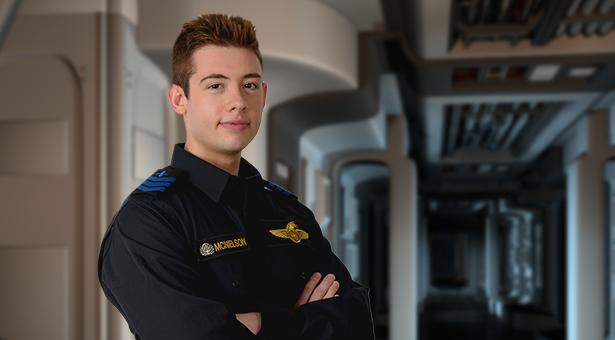

Petty Officer (PPO) Paul McNielson is a propulsion specialist, responsible for the operation and maintenance of the magnetoplasma engines used to propel the vessel through space. This work requires a thorough understanding of plasma generation systems and the powerful magnetic fields used to manipulate plasma for propulsion, as well as a detailed knowledge of the engine’s construction and operation.
Role
PPO McNielson is a senior member of the team currently testing prototype magnetoplasma impulse engines. During a typical watch, McNielson’s team will test-fire a prototype engine and work through a number of evolutions (test scenarios) designed to explore different aspects of the engine’s operation. The results from these trials will form the basis of operating procedures for the engines installed in the vessel.
McNielson and his team can expect to transfer to active duty aboard the vessel after its launch, where they will be responsible for operating, maintaining and repairing the main engines. Once aboard, McNielson will report to the propulsion chief – unless of course he is selected for the post himself.
Career
McNielson began his career with the Royal Australian Air Force as a trainee jet-engine technician, before coming to the attention of an advanced program working with experimental scramjet technology. McNielson’s skill in optimising engine performance well beyond design parameters earned him the respect of senior officers, one of whom requested that McNeilson follow him to a highly classified magnetoplasma engine program run by the US Air Force (USAF).
McNielson was with the program for just over a year, during which time success proved elusive. The program was unable to produce enough thrust from the magnetoplasma process to propel vessels of the size envisaged by the USAF deep-space exploration program. The technology required to boost the performance of the engines (magnetic impulse acceleration) was discovered first by the ISDC’s fledgling deep-space program, which McNielson’s commanding officer was persuaded to join. At the request of this officer and after a rigorous recruitment process, McNielson also transferred to the ISDC.
ISDC Career
McNielson joined the ISDC as part of the ‘direct entry’ program, which recognises the skills, experience and rank of those already in military service and provides positions at equivalent rank and seniority within the ISDC. McNielson’s rank in the USAF was the equivalent (with a slight promotion) of the petty officer rank in the ISDC.
McNielson also undertook a number of specialist training programs in propulsion, the bring him up to speed on the current state of technology in use by the ISDC (aspects of which were significantly more advanced than what he had worked with at the USAF). After completed this ‘familiarisation’ training, McNielson was granted an advanced rating in his propulsion specialisation.
Next Steps
McNielson has proven his capabilities with an excellent record during his time with the ISDC and is highly likely to be considered for the role of propulsion chief aboard the vessel when it launches. This would be accompanied by a promotion to the rank of chief petty officer (CPO), which is the usual rank held by departmental chiefs aboard.
Becoming a Propulsion Specialist
Interested in PPO McNielson's role as a propulsion specialist?
To take on a similar role yourself, you’ll need to sign up as military crew and apply for the engineering branch.
You’ll be given all the training you need to come to grips with magnetoplasma impulse propulsion, including online reference materials, on-demand video lectures and interactive seminars. Once you know the basics, you’ll be able to take part in hands-on simulations so you can put what you know into practise and hone your skills.
The best performing propulsion specialists will be in the running to join Endeavour’s first crew for launch.









